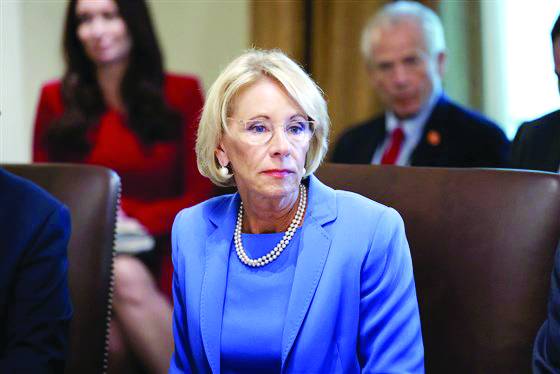WASHINGTON - The Trump administration is threatening to cut funding for a Middle East studies program run by the University of North Carolina and Duke University, arguing that it’s misusing a federal grant to advance “ideological priorities” and unfairly promote “the positive aspects of Islam” but not Christianity or Judaism.
An Aug 29 letter from the US Education Department orders the Duke-UNC Consortium for Middle East Studies to revise its offerings by Sept 22 or risk losing future funding from a federal grant that’s awarded to dozens of universities to support foreign language instruction. The consortium received $235,000 from the grant last year, according to Education Department data.
A statement from the UNC-Chapel Hill says the consortium “deeply values its partnership with the Department of Education” and is “committed to working with the department to provide more information about its programs.” Officials at Duke declined to comment. The Education Department declined to say if it’s examining similar programs at other schools.
Academic freedom advocates say the government could be setting a dangerous precedent if it injects politics into funding decisions. Some said they had never heard of the Education Department asserting control over such minute details of a program’s offerings.
“Is the government now going to judge funding programs based on the opinions of instructors or the approach of each course?” said Henry Reichman, chairman of a committee on academic freedom for the American Association of University Professors. “The odor of right wing political correctness that comes through this definitely could have a chilling effect.”
More than a dozen universities receive National Resource Center grants for their Middle East programs, including Columbia, Georgetown, Yale and the University of Texas. The Duke-UNC consortium was founded in 2005 and first received the grant nearly a decade ago.
Education Secretary Betsy DeVos ordered an investigation into the program in June after North Carolina Rep. George Holding, a Republican, complained that it hosted a taxpayer-funded conference with “severe anti-Israeli bias and anti-Semitic rhetoric.”
The conference, titled “Conflict Over Gaza: People, Politics and Possibilities,” included a rapper who performed a “brazenly anti-Semitic song,” Holding said in an April 15 letter.
In a response, DeVos said she was “troubled” by Holding’s letter and would take a closer look at the consortium.
The inquiry joins a broader Education Department effort to root out anti-Semitism at US universities. Speaking at a summit on the topic in July, DeVos attacked a movement to boycott Israel over its treatment of Palestinians, calling it a “pernicious threat” on college campuses.
Last year, the department reopened an investigation at Rutgers University in which an outside group was accused of charging Jewish attendees for admission while allowing others in for free.
In the UNC-Duke case, the department’s findings did not directly address any bias against Israel but instead evaluated whether the consortium’s proposed activities met the goals of the National Resource Center program, which was created in 1965 to support language and culture initiatives that prepare students for careers in diplomacy and national security.
Investigators concluded that the consortium intended to use federal money on offerings that are “plainly unqualified for taxpayer support,” adding that foreign language and national security instruction have “taken a back seat to other priorities.” The department cited several courses, conferences and academic papers that it says have “little or no relevance” to the grant’s goals.
“Although a conference focused on ‘Love and Desire in Modern Iran’ and one focused on Middle East film criticism may be relevant in academia, we do not see how these activities support the development of foreign language and international expertise for the benefit of US national security and economic stability,” the letter said.






